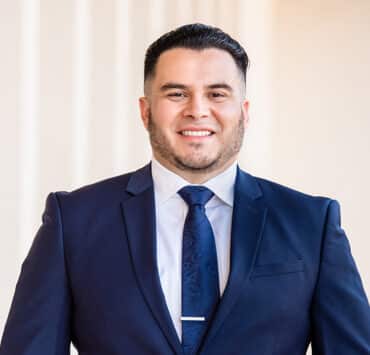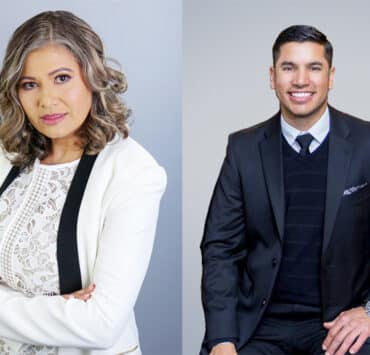|
Getting your Trinity Audio player ready...
|
If an organization wants to build a connection to its community, if it is truly invested in working for the betterment of people both inside and outside its walls, it will hire someone like Orson Aguilar. The senior director of public affairs at Oportun has spent his entire career working to help others achieve their dreams, regardless of where they come from or what obstacles may be in their way.
Aguilar is a veteran public policy and consumer advocate, having spent twenty years at the Greenlining Institute, a nonprofit that advocates for economic opportunity for—and empowerment of—people of color. He worked his way up from a program manager position to president of the organization in just over ten years.
Oportun is Aguilar’s first position in the private sector, but the organization’s mission-driven work and determination to accelerate the economic advancement of its customers and communities it serves aligns perfectly with Aguilar’s upbringing, his skills, and his own mission of community empowerment.
Aguilar’s parents emigrated from Guatemala and raised their three children in a two-bedroom apartment in the Boyle Heights neighborhood of Los Angeles. “We grew up in a dynamic environment,” the senior director says. “Our apartment complex had over a thousand units, and since nobody had a yard, we were always interacting with each other. Whether we were eating tacos in someone’s apartment or just walking around the neighborhood, it seemed like everyone knew your name.”
It was only later that Aguilar would realize that his upbringing came hand in hand with experiences that are far from universal. His parents, like many of the parents in the complex, worked long and often nontraditional hours, which meant Aguilar sometimes had to navigate tumultuous situations.
“I thought everyone had to deal with shootings, with friends dying and with helicopters flying overhead every night,” he explains. “I lived in a community where we all rented apartments and nobody had college degrees.”
As a young man, Aguilar developed asthma (a condition he has to manage to this day), which he attributes to the environmental factors in the area. Train yards, freeways, incinerators, factories, and lead paint were all prominent in Boyle Heights; as a result, environmental justice is an issue that remains close to Aguilar’s heart to this day.
But Aguilar’s passions extended to other aspects of his community, and as a young man attending the University of California at Santa Cruz, he helped create an after-school club for kids. He and his friends got permission to use a community center for tutoring and other enrichment activities. “I realized that I wasn’t exposed to other professionals in the world other than teachers and police officers,” Aguilar explains. “Our goal was to help kids who had come from similar circumstances to encourage them to continue their education.”
Twenty-five years later, Aguilar is helping similar communities access credit and financial services. Such services have often eluded Oportun’s customers, Aguilar says, solely because they haven’t been able to establish credit scores. “This role has been a natural segue for me,” he says. “I have always been a strong advocate for inclusive and affordable credit that leads to stronger economic outcomes for families like mine.”
Orson Aguilar discusses his transition to Oportun and the private sector:
Prior to Aguilar’s arrival at Oportun, the company had submitted a bank charter to expand their ability to serve communities across the United States. While that charter is still a work in progress, Aguilar says it’s been incumbent on him to keep an eye on the direction of federal policy, maintain relationships with vital stakeholders, and find alignment with other consumer advocates.
One of those valuable partnerships has come through: Oportun’s relationship with the National Community Reinvestment Coalition. The two organizations issued a joint statement advocating for inclusive access and fair lending in a financial world that is finding itself more and more automated by artificial intelligence.
“We both want to make sure that we’re always responsible for our credit decisions,” Aguilar says. “We want to make sure that in this new financial world, we’re providing fair access to capital, especially for Black, Latinx, and other underserved communities.”
Given his extensive experience working on behalf of communities in need, there’s no doubt as to why Aguilar has found himself on the boards of community-oriented organizations such as GRID Alternatives and Green Latinos.
“Throughout my career I have found myself collaborating with community leaders, bank executives, and top government officials on economic opportunity programs,” Aguilar reflects. “For me, being collaborative is the most important thing you can do to succeed in a career.”
Looking back on his career, Aguilar is adamant that he would not be where he is today were it not for specific programs aimed at helping economically disadvantaged and underserved communities pursue their education. From his college acceptance to his public affairs MPA from the University of Texas at Austin to the Congressional Hispanic Caucus Institute fellowship that gave him the opportunity to pursue his passion of community empowerment, Aguilar’s experiences make him the perfect example of how increasing access and opening up opportunities can create leaders who are invested in improving the outcomes of future generations.

